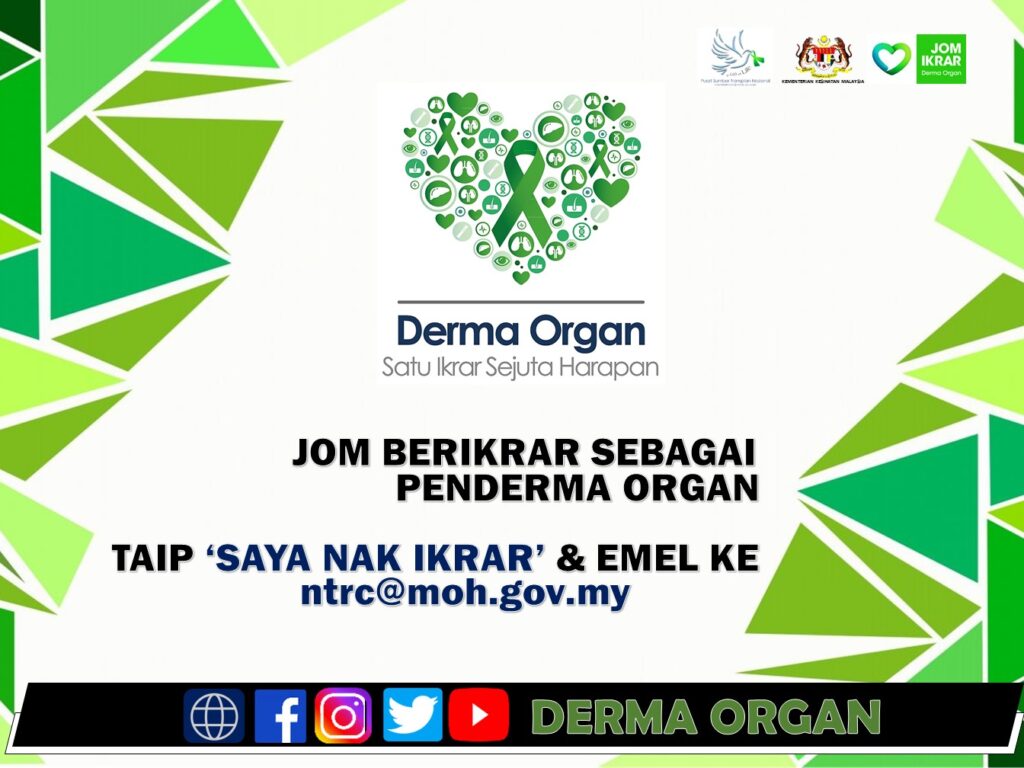
One organ donor can potentially save up to 8 lives. The importance of registering your decision about becoming a donor is imperative because it could save someone’s life and create better quality health outcomes for patients waiting for transplants around the world. Organ donation is the process of donating a person’s organ for transplantation. This happens when a person who can no longer use their organs due to an accident or disease donates them to the people in need. However, if you are in good health and want to do your part, you can do so too. Read on to find out how to register as an organ donor online and donate organ in Malaysia.
Organ Donation Facts
Before you register as an organ donor, you must first know and understand more about organ donation. Firstly, not all organs and tissues of the human being can be donated for transplant.
Organs that can be donated for transplant:
- Heart
- Lungs
- Liver
- Kidneys
- Pancreas
- Intestines
Tissue that can be donated for transplant:
- Corneas
- Bone/tendon
- Vein/artery
- Heart valves
- Skin
Types of organ donation
According to the National Transplant Resource Centre’s website, there are also 2 types of organ donation .
Organ Donation After Death
The first would be organ donation after death. By signing up for this, you agree to donate your organs after your death. There are two types of organ donation after death for the purpose of transplantation. In Malaysia, a person who has been confirmed to have died of brain death can donate all types of organs and tissues.
Meanwhile, patients who have been confirmed to have died of cardiac death can donate all types of tissues only. These include the cornea, heart valves, bones and skin.
However, post-death organ and tissue donation can only proceed after receiving permission from the next of kin or family. Therefore, if you wish to be an organ donor, it is important to communicate with your family about it. By law, permission from heirs or immediate family must be obtained before organ donation can be made.
Organ Donation During Life
Next, organ donation during life is to donate your organ to someone when you are alive. For certain, this is only possible after some assessment by a physician. The donor must undergo a series of tests to identify the level of health of the donor and the suitability of organ donation to the recipient. This is to ensure that organ donation during life is carried out without compromising the health and safety of the donor.
Organ donation from living donors who have family ties is more encouraged. If the donor does not have family ties with the prospective recipient, they must obtain approval from the Ministry of Health Malaysia first.
However, only one of the kidneys or part of the liver of the donor can be donated for organ donation during life.
Register as an organ donor in Malaysia
If you have fully understood the types of organ donation, you may proceed to register as an organ donor in Malaysia. The process is simple: You can now register as an organ donor online, just at your fingertips.
Step 1:
First, type “SAYA NAK IKRAR” or “I WANT TO PLEDGE” and send an email to the National Transplant Resource Centre at [email protected].

Step 2:
Then, wait for a reply from the centre.
Step 3:
Once you’ve received a reply, they will need you to send your personal details and also the details of your next of kin. Therefore, make sure your next of kin or loved ones are aware and acknowledge your intention to be an organ donor.
Step 4:
Lastly, wait for the verification from the centre and they will send you a pledger card after that. Done!
Visit the National Transplant Resource Centre
Alternatively, if you would like to pledge as an organ donor physically instead of online registration, you may visit the National Transplant Resource Centre instead.
At the centre, you could ask the staff some questions and have a better understanding of the whole organ donation process. It is recommended if you are unsure of your decision.
Location: Level 5, Menara Wisma Sejarah, Jalan Tun Razak Kuala Lumpur
Operating hours: 9 am – 12 pm & 2.30 pm – 4.30 pm
For more information, please visit the National Transplant Resource Centre’s website.










